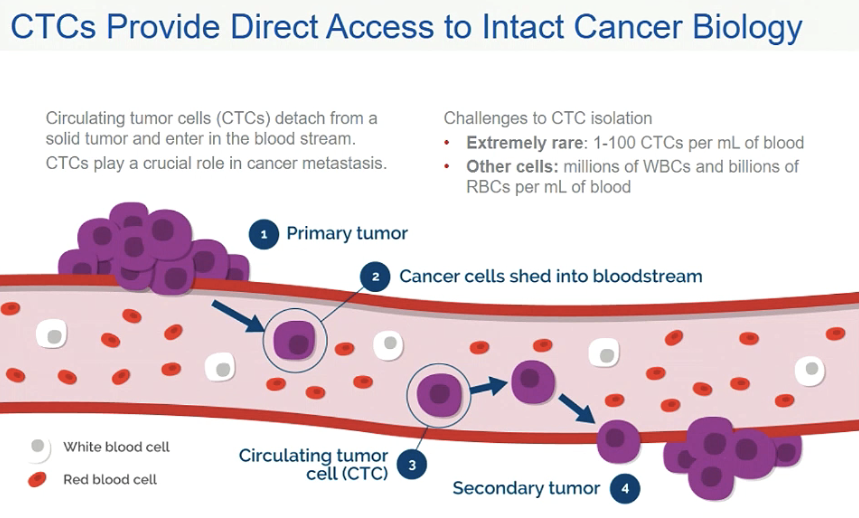19 januari 2026: Zie ook dit artikel: https://kanker-actueel.nl/NL/ctdna-circulerend-dna-in-bloed-meten-geeft-betere-prognose-op-resultaten-en-effectiviteit-van-behandelingen-bij-borstkanker-type-her2-positief-dan-complete-remissies.html
5 augustus 2018: Lees ook dit artikel:
5 augustus 2018: Bron:
Een eenmalig uitgevoerde bloedtest op in bloed circulerende tumorcellen (CTC assay) op 5 jaar na de diagnose van operabele niet uitgezaaide hormoongevoelige borstkanker (ER positief) kan onafhankelijke voorspellende informatie geven voor de kans op een recidief na 5 jaar klinisch kankervrij te zijn geweest.
 Bron foto: SLAS
Bron foto: SLAS
In een tweede analyse van een gerandomiseerde klinische studie, waren 5 jaar of langer na de diagnsoe nog altijd circulerende tumorcellen detecteerbaar bij 26 van de 547 patiënten (4,8%) met operabele lokale niet uitgezaaide borstkanker. Circulerende tumorcellen blijken dan ook een veel hoger risico te geven op een recidief bij patiënten met hormoongevoelige borstkanker. Zelfs na 5 jaar klinisch kankervrij te zijn geweest.
In deze tweede studie werden patiënten van 2007 tot 2011 geanalyseerd die tussen 4,5 jaar en 7,5 jaar nog geen aantoonbaar recidief hadden gekregen na bij de diagnose een primaire chirurgische behandeling gevolgd door hormoontherapie als systemische behandeling van hormoongevoelige borstkanker (ER positief - stadium II-III). Patiënten werden opgenomen in een subprotocol voor een tweede analyse van 25 februari 2013 tot 29 juli 2016. De analyse zelf werd uitgevoerd in april 2018.
Bij 547 vrouwen die in deze analyse zijn opgenomen, waren de resultaten van de meting via een CTC-assay van in bloed circulerende tumorcellen (1 tumorcel per 7,5 ml. bloed) positief voor 18 van de 353 borstkankerpatiënten met hormoongevoelige ziekte (5,1% [95% CI, 3,0% -7,9%]); 23 van de 353 borstkankerpatiënten (6,5% [95% CI, 4,2% -9,6%]) hadden een aantoonbaar recidief gekregen.
De onderzoekers stelden vast dat het recidiefpercentage per persoonsjaar in de CTC-positieve en CTC-negatieve groepen respectievelijk 21,4% (7 recidieven per 32,7 persoonsjaren) en 2,0% (16 recidieven per 796,3 persoonsjaren) was. Een behoorlijk groot verschil dus.
In een multivariabele analyse werd een positief CTC-assayresultaat (in bloed circulerende tumorcellen) geassocieerd met een 13.1 keer hoger risico op een recidief (hazard ratio puntschatting, 13.1; 95% CI, 4.7-36.3).
Het CTC-testresultaat was ook positief voor 8 van de 193 patiënten (4,1% [95% CI, 1,8% -8,0%]) met hormoonreceptor-negatieve ziekte, hoewel daarvan slechts 1 patiënt (0,5% [95% CI, 0% -2,9 %]) een recidief van de ziekte kreeg en deze patiënt vertoonde geen in bloed circulerende tumorcellen. (CTC-negatief).
De conclusie uit deze tweede analyse is dan ook dat een eenmalig uitgevoerde bloedtest op in bloed circulerende tumorcellen (CTC assay) op 5 jaar na de diagnose van operabele niet uitgezaaide hormoon receptor-positieve borstkanker (ER positief) onafhankelijke voorspellende informatie kan geven voor de kans op een recidief na 5 jaar klinisch kankervrij te zijn geweest.
Het volledige studierapport: Association of Circulating Tumor Cells With Late Recurrence of Estrogen Receptor–Positive Breast Cancer is tegen betaling in te zien.
Hier het abstract van deze studie waaruit ik bovengenoemde tekst heb gemaakt:
A single positive CTC assay result 5 years after diagnosis of hormone receptor–positive breast cancer provided independent prognostic information for late clinical recurrence, which provides proof of concept that liquid-based biomarkers may be used to risk stratify for late recurrence and guide therapy.
Gerelateerde artikelen
- Bloedtest (TARDIS - TARgeted DIgitial Sequencing) op in bloed circulerende tumor-DNA meet en voorspelt overgebleven ziekte voor en na behandelingen van borstkanker
- Bloedtest die methyl meet in cellen kan ruim van te voren voorspellen of iemand borstkanker gaat ontwikkelen. Blijkt uit jarenlang onderzoek.
- In bloed circulerende tumorcellen zijn zelfs op 5 tot 7 jaars metingen sterk voorspellend voor alsnog een recidief van hormoon gevoelige borstkanker
- bloedtest na behandeling van borstkanker waarbij resistentie optreedt traceert HER2 mutaties die soms ontstaan tijdens de behandeling met Kinaseremmers en hormoontherapie copy 1



Plaats een reactie ...
Reageer op "In bloed circulerende tumorcellen zijn zelfs op 5 tot 7 jaars metingen sterk voorspellend voor alsnog een recidief van hormoon gevoelige borstkanker"